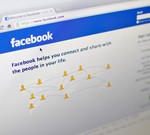
A University of California (UC) San Diego researcher who helped prove well-placed Election Day Facebook ads could boost voter turnout said social media could be the most effective way to get Americans to the voting booth this November.
A UC San Diego research team on the day of the 2010 midterm elections posted a reminder to vote on the Facebook pages of 61 million Americans. The “Today is Election Day” banner ad linked to polling place information and displayed photos of users’ Facebook friends who had said they voted.
A control group of 600,000 Facebook members did not receive the voting reminder in their news feeds, and another 600,000 were shown a modified version of the Election Day message without the pictures of friends next to the news feed item.
The rate of voter turnout, UC San Diego researchers found, was highest among those who saw the message with their friends’ photos included. As many as 60,000 people cast votes on Nov. 2, 2010, because they saw the Facebook ad, according to data detailed this month in the journal Nature.
The “social contagion” impact of the Facebook message drove another 280,000 people to vote during Congressional midterms, the researchers explained.
“Social influence made all the difference in political mobilization,” said James Fowler, UC San Diego professor of political science in the Division of Social Sciences and of medical genetics in the School of Medicine. “It’s not the ‘I Voted’ button, or the lapel sticker we’ve all seen, that gets out the vote. It’s the person attached to it.”
Examining the impact only on those who received the voting reminder on the Facebook pages would be to ignore the viral nature of the internet, and specifically widely-used social media, Fowler said.
“If you only look at the people you target, you miss the whole story,” Fowler said. “Behaviors changed not only because people were directly affected, but also because their friends (and friends of friends) were affected.”
Political observers said the university-based experiment showed that Facebook and other social media channels could have a lasting impact on political contests in coming years.
“In situations where our behavior is public, we’re very concerned with acting in a way that conforms to local group norms—or at least giving the impression that we are,” Jesse Singal, a writer for the Policy Shop blog at the Demos thinktank. “This is a powerful potential leverage point for policy makers designing interventions, whether we’re talking about voting, bullying, smoking, or any behavior with a public component..”
Filling Facebook news feeds with reminders to vote, Signal wrote, would likely fail to reach underrepresented groups, instead targeting people who wouldn’t be a stranger to voting booth. Signal said, no matter the outreach effort, it would be “tougher to reach the people who need and would benefit most from the intervention.”
“This will be less of an issue as researchers get better and better at micro-targeting certain nodes in a network, and it does nothing to detract from the key takeaway: social influences may be a much more potent tool for increasing voter turnout than blunter informational campaigns,” Signal wrote.
Interactions with “close friends” on Facebook – friends who were likely close to a Facebook user outside of the social media world – had the greatest impact on voter turnout. Almost all of the voting increase was directly attributable to Facebook users who saw that their close friends had said they voted on the news feed ad.
“The main driver of behavior change is not the message – it’s the vast social network. Whether we want to get out the vote or improve public health, we should not only focus on the direct effect of an intervention, but also on the indirect effect as it spreads from person to person to person,” Fowler said.
Voter turnout during the 2010 midterm election was 37 percent, about 16 percent lower than the 2008 presidential election. Midterm turnout rates are typically lower than in presidential election years.
Maine had the highest voter turnout in 2010, with 54 percent of eligible voters casting ballots. Tennessee recorded by far the lowest turnout rate at 26 percent.
- Research: Social media has negative impact on academic performance - April 2, 2020
- Number 1: Social media has negative impact on academic performance - December 31, 2014
- 6 reasons campus networks must change - September 30, 2014
